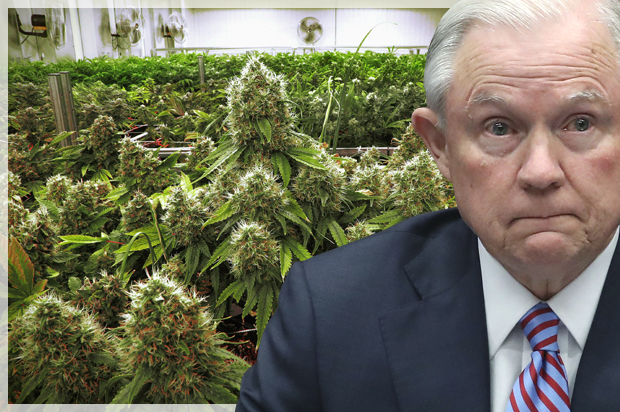Cannabis Advocates Sue AG Sessions and the Federal Government

On July 25, a group of advocates gathered in New York to announce a lawsuit challenging the constitutionality of the Controlled Substances Act (CSA). The night before, lawyers representing a diverse group of five plaintiffs filed a federal complaint against Attorney General Jeff Sessions, the Drug Enforcement Administration (DEA) and the U.S. federal government.
The plaintiffs include Marvin Washington, a former NFL player-turned cannabis entrepreneur; two children and one veteran who are medical marijuana patients; and the New York-based Cannabis Cultural Association. The complaint challenges the constitutionality of marijuana’s Schedule I status (“no currently accepted medical use”) by pointing out the government’s seemingly untenable stance of having a patent for the medical use of certain cannabinoids.
The suit also delves into the racial disparities of drug enforcement and the challenges presented to patients who must relocate to access the potentially life-saving medicine. Such patients have come to be known as medical marijuana refugees.
“Although not styled as a class action, this lawsuit stands to benefit tens of millions of Americans who require, but are unable to safely obtain, cannabis for the treatment of their illnesses, diseases and medical conditions,” the complaint reads.
“I’m confident that together, we’re going to win this case against the federal government,” said Michael Hiller, founder of Hiller, PC, which is representing the plaintiffs in the suit and where the press conference took place.
Hiller noted Sessions’ request to use federal funds to prosecute patients, and the AG’s support of civil asset forfeiture (“which raises its own very substantial constitutional issues”) and mandatory minimums for low-level drug offenses.
“The Justice Department led by Jeff Sessions is not only on the wrong side of this issue, but he’s going in the wrong direction,” Hiller contended. “This must stop. This lawsuit is going to provide an answer. The Controlled Substances Act is unconstitutional on multiple grounds.”
The five plaintiffs have varying reasons for joining the suit. An investor in several cannabis companies, Washington wants to participate in the federal Minority Business Enterprise program, but can’t because of the federal ban on marijuana. “The reason I’m a part of this lawsuit is not as a football player, it’s as a member of my community,” he stated. “The African-American community and people of color… have been unfairly punished [under the CSA].”
Washington also mentioned studies that show declines in opioid abuse in states that legalized medical marijuana and how opioid problem impact current and former NFL players. “If you extrapolate that across the country, I believe you can heal the ills that is hurting this nation,” he declared. “I believe I’m on the right side of history, and we just need our Department of Justice and the DEA to get on the right side of this fight.”
Three plaintiffs in the suit are patients that have been helped by medical marijuana. Eleven-year-old epilepsy patient Alexis Bortell moved with her family from Texas to Colorado in 2015 to access medical cannabis. She’s been seizure-free for the last two years.
Six-year-old Jagger Cotte suffers from Leigh’s Disease, a rare neurodegenerative illness. According to the complaint, his life has been extended and pain relieved thanks to his cannabis regimen.
Army veteran Jose Belen fought in the Iraq war, where he developed PTSD. The VA prescribed opioids proved to be ineffective; instead, he found relief with medical marijuana.
The patients named in the suit are unable to travel freely throughout the country and can’t enter federal buildings with cannabis. Those with military ties are not allowed on military bases and aren’t able to obtain the benefits they’re entitled to.
The Cannabis Cultural Association advocates for people of color in the industry. “No other laws demonize people of color more than cannabis laws,” said Jacob Plowden, one of the organization’s co-founders. “These drug laws must change.”
While Hiller’s hoping that Sessions and U.S. government will “not contest our lawsuit, but to get behind it,” others at the press conference called on the attorney general to step down.
“We call on you to either assist us in reversing the terrible impacts of this law or step aside and let somebody else do that,” said David Holland, co-counsel in the case and executive legal director for Empire State NORML.
Numerous legislative efforts to amend marijuana’s legal status have not succeeded. The Ending Marijuana Prohibition Act of 2017, which would remove cannabis from the CSA, has yet to be voted on and probably won’t be. Bernie Sanders (I-VT) originally sponsored it in the Senate in 2015 and it was reintroduced in the House by Tom Garrett (R-VA) and Tulsi Gabbard (D-HI) in February.
Last August, the DEA rejected two administrative rescheduling petitions. At the time, Freedom Leaf contributor Paul Armentano provided this history lesson:
“The DEA previously rejected several other rescheduling petitions, including a 2002 petition filed by a coalition of marijuana law reform and health advocacy organizations and a petition filed by NORML. That petition was not acted upon by the agency until 1988, and was ultimately set aside by the DEA in 1990.”

